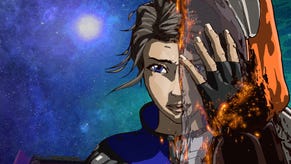Our contributor's favourite games of 2014
Best Writers Pick Best Games
We're blessed at Rock, Paper, Shotgun with the best contributing writers in videogames, so it seemed only reasonable to ask them for some of their finely-worded thoughts on the bestest best games of 2014. We asked Tim Stone, Cara Ellison, Ben Barrett, Brendan Caldwell, Cassandra Khaw, Konstantinos Dimopoulos, Marsh Davies, Rob Sherman and Rich Stanton to pick their favourite and write a brief summary of why, and that's what they did...
Tim Stone
Combat Mission: Red Thunder
Gosh, this is a difficult decision. My heart says Volo Airsport, my head says Door Kickers, and my plums say Ultimate General: Gettysburg, but I think I'm going to go with my Hill 252.2-shaped gut and recognise Combat Mission: Red Thunder's doughty brilliance. Yes, the engine has been around for a few years. Sure, issues like campaign conservatism and the absence of random maps still rankle, but there's nothing like CMRT and its siblings when it comes to turning WW2 history into nail-biting, decision-rich tactical gaming. This instalment comes with heaps of beautifully made maps and scenarios. Its TO&E is fatter and more rounded than usual. Finally, we get flamethrowers and plane-mauling AAA vehicles. CMx2 feels feature-complete at long last. Anyone interested in understanding the technological pecking order on a late-war Eastern Front battlefield (CMRT is focussed on Operation Bagration scraps in Belarus and Eastern Poland) - anyone wondering why period commanders usually looked so care-worn and harassed - will learn more from this scholarly skirmish sim than they would from any reference book.
Cara Ellison
Kentucky Route Zero Act III
Kentucky Route Zero Act III has the single most transcendental moment of any game ever this year, and it was the moment at which Conway and his friends find themselves in the Lower Depths tavern. Here Junebug and Johnny sing "Too Late To Love You" into the night sky. It's an almost empty divebar, where a desolate, melancholy atmosphere is evoked by the stark architecture, and the characters listen patiently as the camera slides into the sky, and the chorus swoops and becomes something sublime. The player can choose between three sets of lyrics for the chorus to this ethereal, iconic song:
When you left me…
I never should have met you…
I wish we’d met before…
Each selection sets the mood of the song, so it's about whatever you are feeling at that moment. Kentucky Route Zero invites the player to interpret themselves. Kentucky Route Zero is the Wordsworth of video games. Five acts will not be enough.
Ben Barrett
World of Warcraft: Warlords of Draenor
I spent a little time hemming and hawing over this - is a decade old subscription MMO really my favourite game of 2014? In the end it came down to simple maths: I spent more time playing and thinking about WoW this year than any other game. Upon the expansion's release, I was hooked immediately, like nothing had changed since my various teen love affairs with the game. Reaching the new level cap was a joy, the quest design a culmination of everything Blizzard has learned about storytelling and the technology they’ve built to facilitate it over ten long years. Player owned Garrisons and Outposts, little slices of personal choice scattered around the world, are the best addition to the game since raid dungeons. More than anything the social side of WoW has stuck with me - I’ve spoken more with old friends these past couple of months than in years previous, freaking out over bosses, loot and patch notes like the world-shaking events they are.
Brendan Caldwell
Elite: Dangerous
Despite floating around as a beta for most of the year, Elite: Dangerous officially nipped into 2014 just last week, like some desperate pilot speeding through a tiny docking port just in time to arrive at the space station's end-of-year party.
I'm glad it did. All right, the ambitious Kickstarted beast has its issues. Grind, long journeys, a handful of bugs. And, like most space sims, it is certainly not for everyone. But for me these problems dissolve on that first evening with your ship, wrestling with the controls, hitting every button to find out what it does only to deploy your lasers inside the docking bay, getting scolded by the station's authoritative announcer. Or the moments when, travelling sullenly in a straight line, you are wrenched out of hyperspace by the star system's police force as you realise with horror that, when they scan you, they will discover the hidden rebel transmissions you are ferrying to some insurrectionists in nearby Alpha Centauri. Not to mention the sheer beauty of it. Screenshots have never done true justice to the game's backwater orbital platforms, glinting as they hang in the crimson light of a red dwarf, or to the cracked surface of the roasted planets orbiting Betelgeuse, or the moment you catch the shadow of your own ship, small and constant, on the bulge of a revolving space station as you come in to dock.
More than all that, Elite is a game with potential. It will be disappointing to see where the concessions to the game's over-ambitious design will inevitably be made (as they arguably already have been). But even if nothing more is added but some new ships, machinery and missions it would still be a must-own sim. If only for the day a consumer version of the Oculus Rift is finally released and you get to see the expanse of unknown space stretching out in all directions, tugging at your vertigo, your excitement, your desire not to be blown up by the cops.
Konstantinos Dimopoulos
The Talos Principle
I never considered myself a puzzle gamer and despite the release of excellent adventures such as the latest Dream Machine episode or Hadean Lands, The Talos Principle is the game I loved and played the most in 2014. It was brilliant and unexpected. Not only were its puzzles extremely clever and demanding of adventure-y lateral thinking, but it is this year's only game that can stand up to thorough literary and philosophical scrutiny. Writers Jonas Kyratzes and Tom Jubert have done a stellar job in creating and fleshing out a unique setting filled with delicious words; words that begin from questioning the game world itself and end up discussing ontology, without ever failing to make the odd joke.
Rob Sherman
With Those We Love Alive
For most of this year, the Windows executable which I have been executing the most is not classified as a game. Stellarium is an open-source astronomy program which I have nevertheless found very satisfying as a playing experience. Inside it I have futzed with the faint buzz of the universe's expansion from a simulated German field in real-time, the closest to a 'hardcore mode' that I could elicit. I have learnt the Ancient Egyptian zodiac by heart. I have platformed around the night sky as it would have looked to a Maori shark hunter on the 13th January, 1137 AD. However, having just done so, I am not allowed to include Stellarium as my game of 2014, because despite my homebrew shenanigans inside it, a version has been scudding around the sky since at least 2001. What was indeed released this year, and which has piqued my attention more than anything else, is Porpentine's With Those We Love Alive. In the spirit of Christmas disclosure, Porpentine ocassionally writes for this website, as I do, but I can promise you that despite an infaunal cultivation of luciferin in my forehead, I've never yet been able to make contact with her in the murk. Her latest game, is a piece of interactive fiction, acidly designed, scored just right by Brenda Neotenomie, and which keeps track of your choices by causing you to draw on your own warm skin. This last mechanic, the most publicised facet of the game, has in some quarters drawn a huge amount of vitriol. Luckily for me, this physical/digital interface, which is not only part of the gameworld and metaphor itself, but is also an interesting way to display one's progress and achievements in a single-player game which does not involve Steam's valueless nonsense or the entirety of foetid uPlay, is something which interests me enormously in my own practice, and is something which people are only just starting to become comfortable with, broadly, in the artform. Get comfortable with it, I say; no matter where games take you, you are still a vitriol-rich, pus-rigid sickbag. Why not use it to your advantage?
Cassandra Khaw
This War of Mine
2014 felt like the year of the survival game, with many titles tiptoeing on the edge of the genre. We had titles like the haunting but brutal The Long Dark and also Alien: Isolation, which wasn't quite a "survival" game in the same way but definitely required you to eke out an agonizing living, anyway. That said, my favorite wasn't either of those but 11 bit Studios' This War of Mine. It's bleak, beautiful, and it lives on the other side of your traditional war game. It's what happens when everyone else is off shooting each other. The game can be a little slow, a little plodding. You spend a lot of time fussing about the nitty-gritty aspects of a battle-savaged life. The nightly excursions into enemy territory can vary in pacing, but there's a surprising amount of simply waiting and watching, breathlessly anticipating a gap in the enemy's pathing so you can race out and grab some cigarettes.
Rich Stanton
Eve Online
My game of the year is EVE Online. Earlier this year RPS was kind enough to commission me for a series of pieces on CCP's venerable MMOG, now well into its second decade.
Partly what impressed me about EVE was that it's so old - and yet still looks amazing, and offers a heady kind of social gaming experience you can't get elsewhere. For a few months I felt my way through a corner of this seemingly endless, complex universe. I met the de facto Emperor of the galaxy, spies, bounty hunters, and a bunch of space junkies just out for the next hit. I found a game that's still growing, still learning, and still fascinating in what it demands from and draws out of players.
I'm not trying to be trendy by selecting a game released in 2003 as my GOTY. It just so happens that EVE surprised and impressed me more than anything else I played this year.
Marsh Davies
Dark Souls 2
Well, what is it, you ask? It's Dark Souls 2. Of course it's Dark Souls 2. Last night, I broke the news to Rich Stanton. Though emotionally cushioned by a fair few pints of beer and several belly-fulls of carbohydrates, I knew I had cut him deep. He leaned back into the chair and closed his eyes, his face a mask of mere toleration. Not even did Seath the Scaleless betray his brothers so. I am sorry, Richard. I am sorry, Hidetaka. But it's true. Dark Souls 2 may not be Dark Souls 1 - it could never be, so perfectly self-contained was that first game - but it's still the best sword-'n'-board action I've had all year. Simply measured in the exchange of blows, Dark Souls 2 is a game of robust, irresistible combat tactics, and even though it sacrifices its predecessor's ideological purity and fails to corroborate its structure with a meta-narrative on Dark Souls' level of ambition, some of its concessions to accessibility are welcome indeed. It doesn't shirk its narrative duties entirely either, dealing with the burden of being a sequel directly and offering its own rich symbolism to unpick: kings and lovers, puppets and brothers - driven by the echoes of shattered souls combined and sundered throughout the millennia. A history cursed to repetition - could there be a more apt self-satirising metatext to a sequel? Sure, even if they acknowledge it, it still feels like an exercise in bottling lightning: they've captured some of the brilliance, but much less of the shock. But even when dimmed, the novelty thinned, the bones of Dark Souls burn brighter than all else. Sadness, you might say, but hurrah for skeleton.
Back to the complete bestest best PC games of 2014.













